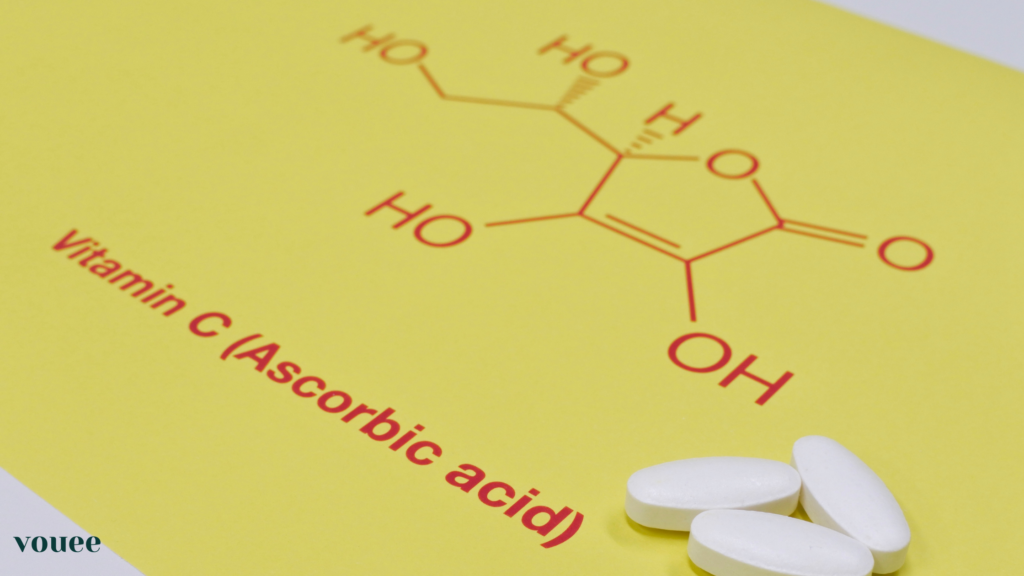Vitamin C, a vital nutrient known for its pivotal role in skin health, often relied on by those of us with melanin-rich skin tones. What about the science and benefits of Vitamin C in the context of darker skin; how does it address our common concerns and do we still have questions about its efficacy and use?
Understanding Hyperpigmentation in Dark Skin Tones
There is no conversation on Vitamin C, without the word ‘hyperpigmentation’ quickly following. We say it all the time, but we will say it once for for those at the back – Hyperpigmentation is a condition marked by patches of skin becoming darker than surrounding areas, results from excess melanin production. Melanin, the pigment responsible for skin color, can overproduce in response to various triggers, leading to uneven skin tone. This condition is notably more prevalent in individuals with darker skin tones due to their higher melanin content. Factors like sun exposure, hormonal changes, and skin injuries contribute to this skin response.
The Role of Vitamin C in Skin Health
Properties and Functions of Vitamin C
Vitamin C, scientifically known as ascorbic acid, is more than just a dietary supplement. This nutrient plays a crucial role in maintaining skin health. It’s a powerful antioxidant that combats free radical damage, supporting the skin’s natural regeneration process, and boosts collagen production, vital for skin elasticity and firmness. Ascorbic acid also assists in reinforcing the skin barrier, enhancing its ability to retain moisture and protect against environmental aggressors.
Vitamin C and Melanin-Rich Skin
For those with darker skin tones, Vitamin C offers specific benefits. It aids in evening out skin tone and reduces the appearance of dark spots – something many of struggle with. This is achieved through its ability to inhibit tyrosinase, an enzyme critical in melanin production. By controlling melanin synthesis, Vitamin C helps in managing hyperpigmentation effectively.
Vitamin C and Dark Skin Tones
Addressing Dark Spots and Uneven Skin Tone
The primary appeal of Vitamin C for darker skin tones lies in its ability to fade dark spots and even out skin tone more gently than other options. Its tyrosinase inhibiting action slows down the melanin production process, which is a key factor in the formation of hyperpigmentation. Regular use of Vitamin C-infused skincare products can lead to a noticeable reduction in dark spots and a more even complexion.
Vitamin C Concentrations and Skin Tolerance
It’s essential to consider the concentration of Vitamin C in skincare products. Higher concentrations can provide more pronounced results but may not be suitable for all skin types, especially sensitive skin. A concentration range of 10-20% is often recommended for efficacy while minimizing potential irritation.

Impact of UV Radiation and Pollution
Environmental factors play a significant role in skin health, particularly for dark skin tones prone to hyperpigmentation. UV radiation is a major contributor to dark spots, as it triggers an increase in melanin production as a protective response. Pollution, especially in urban areas, can exacerbate skin damage and pigmentation issues. Vitamin C’s antioxidant properties help in shielding the skin from these environmental stressors.
Vitamin C as a Protective Agent
Vitamin C’s role extends beyond correcting existing skin issues; it acts as a preventive measure. Its antioxidant properties neutralize free radicals caused by UV exposure and pollution, thereby reducing their impact on the skin. This makes Vitamin C a crucial ingredient in the daily skincare regimen for those living in high-pollution or high-sun-exposure environments.
Table: Benefits of Vitamin C for Dark Skin Tones
| Benefit | Description |
|---|---|
| Evens Skin Tone | Reduces dark spots and promotes a uniform complexion. |
| Antioxidant Protection | Guards against environmental damage from UV rays and pollution. |
| Supports Skin Barrier | Enhances the skin’s ability to retain moisture and defend against external factors. |
Vitamin C in Skincare Products
Forms and Stability of Vitamin C
Vitamin C comes in various forms in skincare products, with L-ascorbic acid being the most studied for skin health. However, it’s crucial to note that L-ascorbic acid is sensitive to light and oxygen, which can degrade its potency. Modern skincare advancements have led to the development of more stable forms of Vitamin C, ensuring its efficacy in skin treatments. Products like serums, creams, and lotions, each offering different concentrations and formulations, make Vitamin C accessible for various skin types and concerns.
Selecting the Right Product for Dark Skin Tones
When choosing a Vitamin C product for dark skin tones, it’s important to consider the type of Vitamin C used, its concentration, and the overall formulation. Products specifically designed for melanin-rich skin often include additional ingredients that complement Vitamin C’s effects, such as hyaluronic acid for hydration or niacinamide for skin barrier support. It’s advisable to start with lower concentrations to assess skin tolerance and gradually increase as needed. For a Vitamin C serum, that uses a stable formulation specifically for darker skin tones, check out this Correct and Boost serum.
Integrating Vitamin C into Skincare Routine
Step-by-Step Application for Optimal Benefits
A well-structured skincare routine maximizes the benefits of Vitamin C. Here’s a guideline:
- Cleansing: Begin with a gentle cleanser to remove impurities and prepare the skin for Vitamin C application.
- Toning (Optional): A toner can help balance the skin’s pH and enhance the absorption of subsequent products.
- Vitamin C Serum: Apply a Vitamin C serum, allowing it to penetrate deeply into the skin. Serums with a water or oil base deliver concentrated Vitamin C effectively.
- Moisturizing: Follow up with a moisturizer to hydrate the skin and lock in the benefits of the serum.
- SPF Application: In the morning, end with a high-SPF sunscreen to protect the skin from UV damage, which can exacerbate hyperpigmentation.
Consistency and Patience in Skincare
Consistency is key in skincare. Regular use of Vitamin C, as part of a daily routine, is essential for visible results. Patience is equally important, as skin improvements, especially in terms of hyperpigmentation, take time to manifest.
Vitamin C vs Other Options
When compared to other skin-brightening ingredients, Vitamin C stands out for its suitability for sensitive skin, even in lower concentrations. Ingredients like retinoids and alpha-hydroxy acids (AHAs) can be more potent but may not be well-tolerated by all skin types, particularly sensitive skin. Vitamin C offers a gentler, yet effective alternative for those seeking to manage hyperpigmentation without causing irritation.
While Vitamin C is generally well-tolerated, it’s important to be aware of its interaction with other skincare ingredients. For example, using Vitamin C with retinol or AHAs/BHAs may increase skin sensitivity. It’s advisable to introduce new products gradually and monitor skin response.
Vitamin C as a Cornerstone in Skincare for Dark Skin Tones
Incorporating Vitamin C into a skincare routine for dark skin tones is not just about targeting specific issues like hyperpigmentation; it’s about embracing a holistic approach to skin health. Vitamin C’s multifaceted benefits – from evening out skin tone to reinforcing the skin barrier – make it a cornerstone in a comprehensive skincare regimen. It’s a proactive step not only in correcting but also in preventing skin concerns, especially relevant for melanin-rich skin susceptible to hyperpigmentation and environmental damage.
Achieving and maintaining healthy, radiant skin requires a long-term commitment. Consistent application of Vitamin C, along with a balanced skincare routine, gradually enhances the skin’s appearance. It’s essential to be patient and persistent, as skin improvements, particularly in hyperpigmentation, unfold over time. Regular use of Vitamin C, combined with other skin-friendly practices like proper hydration and sun protection, paves the way for sustained skin health and radiance.
Enhancing UV Defense with Vitamin C
While sunscreen is non-negotiable in protecting skin from UV-induced damage, Vitamin C adds an extra layer of defense. Its antioxidant properties combat free radical damage caused by UV rays, which is particularly beneficial for dark skin tones that can experience exacerbated hyperpigmentation with sun exposure. Daily use of Vitamin C, coupled with broad-spectrum sunscreen, provides a robust shield against environmental factors that contribute to skin aging and uneven skin tone.
By neutralizing free radicals and inhibiting melanin production, Vitamin C plays a crucial role in preventing the formation of new dark spots. This proactive measure, along with diligent sun protection, keeps the skin even-toned and luminous, countering the common narrative that dark skin is not as vulnerable to sun damage.
Personalized Skincare: Tailoring Vitamin C to Individual Needs
Adapting to Skin Types and Concerns
Personalization is key in skincare. Not all Vitamin C products suit every skin type or address every concern. It’s important to select a Vitamin C formulation that aligns with individual skin types, concerns, and goals. For instance, someone with oily, acne-prone skin might opt for a lighter serum, while someone with dry skin may prefer a richer, hydrating Vitamin C-infused cream. Consulting with a skincare professional can provide tailored recommendations that maximize the benefits of Vitamin C for individual skin needs.
Experimentation and Adjustment
Skincare is often a journey of experimentation and adjustment. It’s about finding the right balance that works for one’s skin. Incorporating Vitamin C into the skincare routine may require some experimentation with different formulations and concentrations to discover what works best. It’s advisable to start with lower concentrations and monitor skin’s response, gradually increasing strength or frequency as the skin acclimatizes.
Vitamin C: A Vital Ingredient for Melanin-Rich Skin
Vitamin C emerges as a pivotal ingredient in the skincare lexicon, particularly for dark skin tones. Its ability to brighten, protect, and enhance skin health makes it an indispensable part of any skincare routine. Embracing Vitamin C is more than a skincare step; it’s an investment in the long-term health and beauty of melanin-rich skin. By consistently incorporating Vitamin C into daily skincare, individuals with dark skin tones can achieve a more even, radiant complexion, confidently showcasing their skin’s natural beauty.







You must be logged in to post a comment.